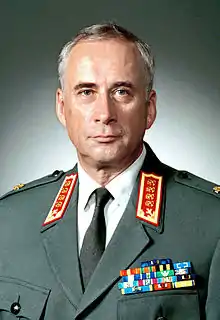Gustav Hägglund | |
|---|---|
 | |
| Birth name | Johan Edvin Birger Gustav Hägglund |
| Born | 6 September 1938 Viipuri, Finland (now Vyborg, Russia) |
| Allegiance | Finland |
| Service/ | Finnish Army |
| Years of service | 1958–2001 |
| Rank | General |
| Commands held | UNIFIL Chief of Defence |
| Battles/wars | Arab–Israeli conflict (1978) Israeli–Lebanese conflict (1986–88) |
| Relations | Woldemar Hägglund (father) |
Johan Edvin Birger Gustav Hägglund (born 6 September 1938) is a retired Swedish-Finnish general. He was the Chief of Defence 1994–2001, and Chairman of the European Union Military Committee 2001–2004.
Life and career
Johan Edvin Birger Gustav Hägglund was born in Viipuri, Finland on 6 September 1938.[1] Hägglund's father was General Woldemar Hägglund, commander of the Karelian Front in the Second World War. He was born in Viipuri, an area ceded to the Soviet Union in the Second World War. Despite his Swedish-speaking family background, Finnish language immersion was total in his youth, and he ultimately had to learn Swedish at school. Hägglund went to Svenska normallyceum i Helsingfors and was then educated not only at the Cadet School in Finland, but also attended the United States Army Command and General Staff College in Leavenworth, Kansas. He is also a fellow of Harvard University.
Hägglund commanded United Nations troops in 1978–1979 as the commander of the Finnish battalion (FINBATT) in UNEF II in Sinai, as the commander of UNDOF in Golan in 1985–1986, and as the commander of UNIFIL in Southern Lebanon in 1986–88.[2][3]
Hägglund served under Presidents Martti Ahtisaari and briefly under Tarja Halonen. Hägglund's command of the defence forces was characterised by the general modernisation of the force and refocusing from quantity to quality. In the Army, three large "readiness brigades" were formed, and the Air Force upgraded to Hornet F/A-18 fighters. Finland entered NATO's Partnership for Peace programme under Hägglund's command.
A major change was made in the terms of conscription service: reserve officers and NCOs would serve 12 months (lengthened from 11 months), but rank and file would serve 6 months (shortened from 8 months), with some specialists such as military police serving 9 months. Previously the rotation had been thrice per year, in order to maintain a contingent that had been trained at least 4 months. The rotation was changed to twice per year.
Within the military, Hägglund was also a strong proponent of peacekeeping operations, worked to improve their appreciation and opined that officers should necessarily participate. Since Finnish law requires that all participants are volunteers, this brought him into conflict with the officers' union, whose opinion was that peacekeeping experience could not be a requirement for career advancement.
Officer training went through a major improvement due to his actions. The cadet school was promoted to university status as the Finnish National Defence University, and degrees formalised.
Hägglund has published three books, one concerning the defence of Finland, one about the defence of Europe and an autobiography. In the 2000s, Hägglund promoted the development of the independent defence of Europe, and took the view that the United States would shift its focus away from Europe, changing the role of NATO.
References
- Gustav Hägglund: Leijona ja kyyhky (2006), Otava, ISBN 978-951-1-21161-7
Notes
- ↑ "Gustav Hägglund". Biografiskt lexikon för Finland (in Swedish). Helsingfors: Svenska litteratursällskapet i Finland. urn:NBN:fi:sls-5375-1416928957981.
- ↑ "Itse asiassa kuultuna: Kenraali Gustav Hägglund" (in Finnish). Yle. 3 December 2018. Retrieved 5 August 2020.
YK-tehtävissä hän on ollut kolmessa paikassa: YK:n suomalaisen valvontajoukon komentajana Siinailla, Golanilla Undof-joukkojen komentajana ja Unifil-joukkojen komentaja Libanonissa.
- ↑ Paakkinen, Reeta (5 September 2018). "Oman tyttären kysymys sai kenraalin kannattamaan naisten asepalvelusta – Gustav Hägglund pitää Nato-optiota Suomen valttikorttina". Aamulehti (in Finnish). Retrieved 5 August 2020.
Kansainvälisissä YK-tehtävissä suomalaisen rauhanturvajoukon komentajana Siinailla (1978–1979), rauhanturvaoperaation komentajana Golanilla (1985–1986), komentajana Libanonissa (1986–1988).
External links
- "Gustav Hägglund". Biografiskt lexikon för Finland (in Swedish). Helsingfors: Svenska litteratursällskapet i Finland. urn:NBN:fi:sls-5375-1416928957981.